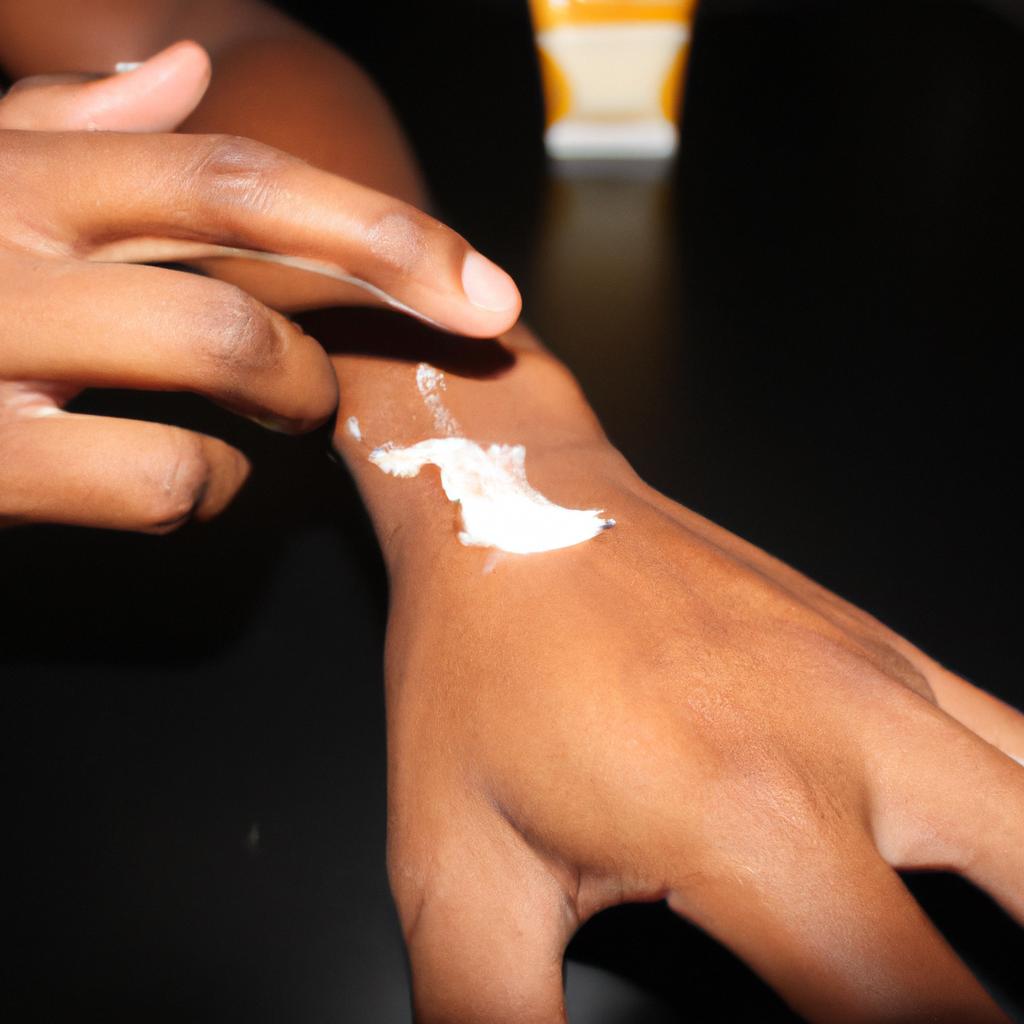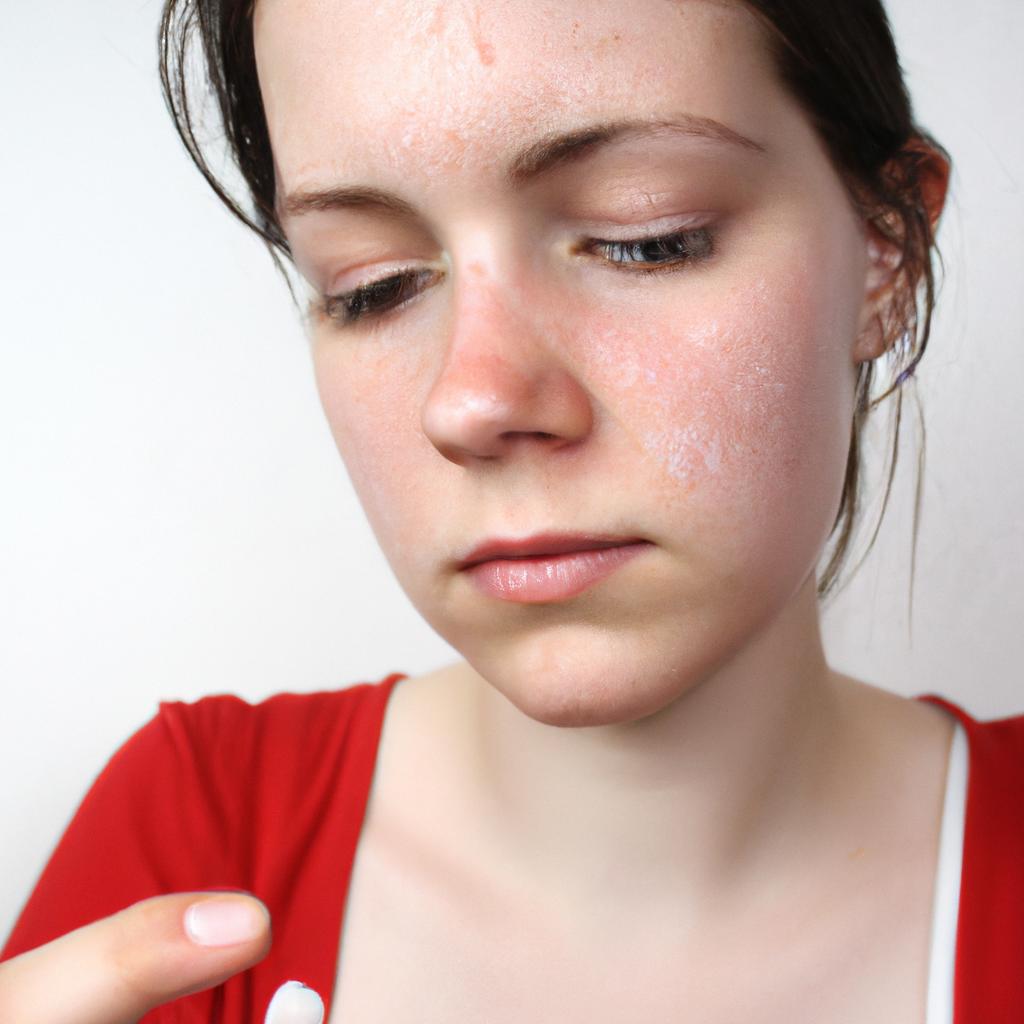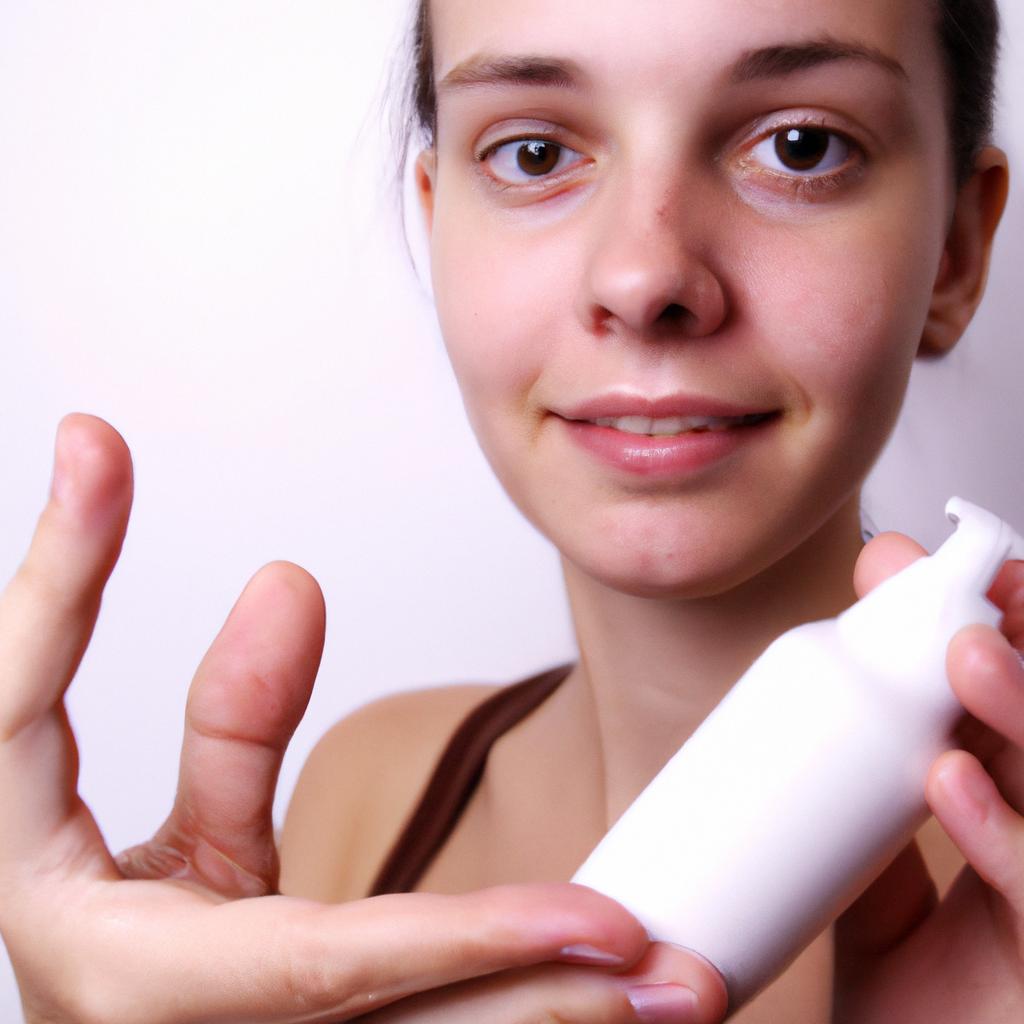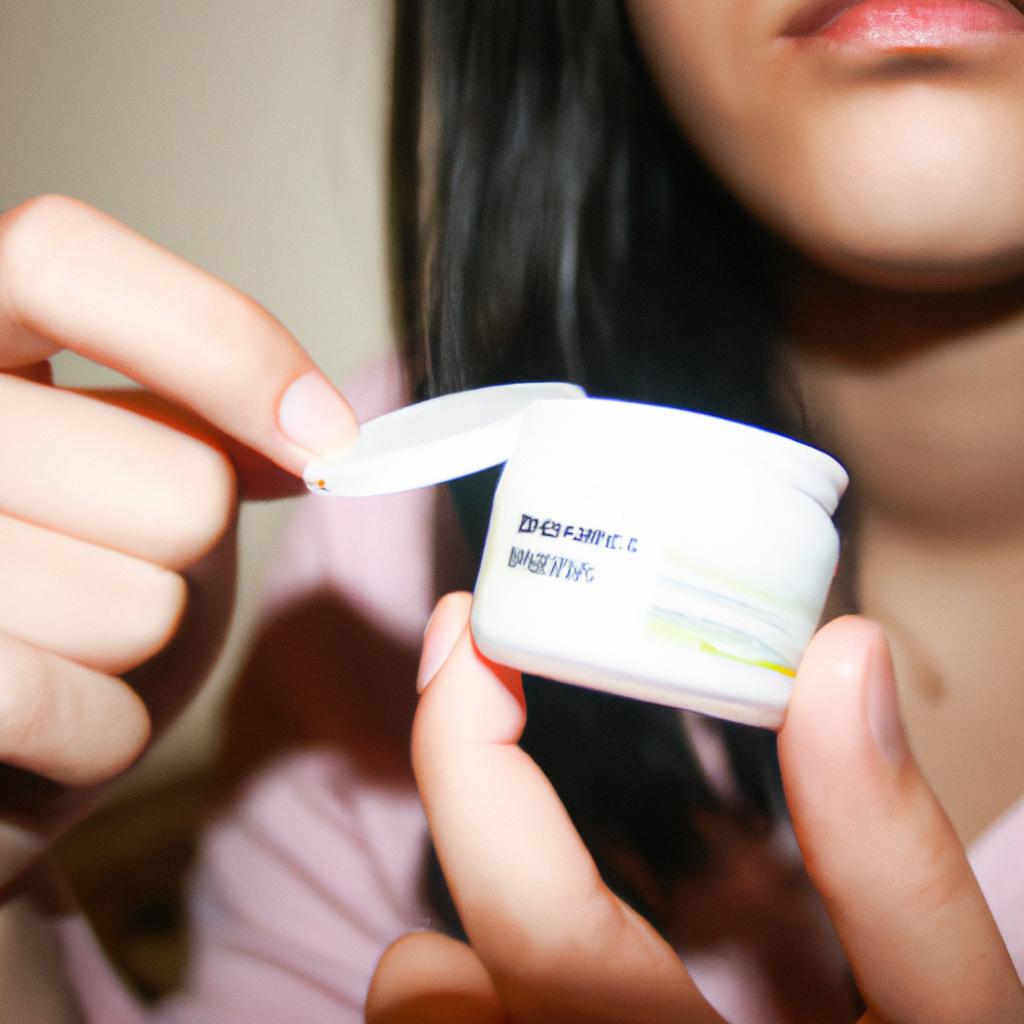Acne is a common dermatological condition that affects millions of individuals worldwide. It manifests as unsightly blemishes, pimples, and cysts on the skin, predominantly in areas such as the face, neck, back, and chest. In an attempt to combat this persistent problem, people often turn to various skincare products available in the market. However, despite their widespread usage and claims of effectiveness, these products can pose significant challenges for acne sufferers due to their potential adverse effects and questionable efficacy.
For instance, consider a hypothetical scenario where an individual named Sarah struggles with severe acne breakouts. Frustrated by her persistent condition, she decides to explore different skincare products suggested by friends and online forums. She purchases multiple over-the-counter treatments promising miraculous results but finds herself disappointed when none of them provide the desired outcome. Such experiences are not uncommon among those seeking relief from acne through commercial skincare solutions. The purpose of this article is to shed light on the problems associated with using skincare products for treating acne while critically examining their effectiveness and potential side effects. By understanding these issues more comprehensively, individuals can make informed decisions about their skincare routines and seek appropriate professional guidance when necessary.
Understanding Acne: Causes and Factors
Imagine a teenager named Sarah who has been struggling with acne for years. Despite her diligent efforts to follow skincare routines and use various over-the-counter products, she continues to experience frequent breakouts. Like many others facing this common skin condition, Sarah is left wondering about the underlying causes of her persistent acne.
Acne, characterized by pimples, blackheads, and whiteheads on the face, chest, back, or other areas of the body, is primarily caused by factors such as excess oil production, clogged hair follicles (pores), bacteria buildup on the skin’s surface, and inflammation. The interplay of these elements can lead to different types of acne lesions that vary in severity from mild to severe.
- Acne affects approximately 85% of people between the ages of 12 and 24 worldwide.
- Psychological distress resulting from acne includes low self-esteem, social anxiety, depression, and impaired quality of life.
- Acne can leave physical scars even after it resolves.
- Treatment options range from topical creams to oral medications depending on the severity.
Moreover, certain triggers exacerbate acne symptoms. These may include hormonal fluctuations during puberty or menstrual cycles, stress levels affecting hormone regulation, dietary choices high in refined carbohydrates or dairy products triggering insulin release and subsequent oil production. It is important to note that while these factors contribute to acne development in many individuals, each person’s experience may differ due to unique genetic predispositions and environmental influences.
Transitioning into our next section exploring “The Role of Hormones in Acne Breakouts,” we delve deeper into how hormonal imbalances impact sebum production and contribute significantly to acne formation. Understanding this intricate relationship will provide valuable insights into effective treatment strategies for managing acne-prone skin without resorting solely to skincare products targeting surface symptoms.
The Role of Hormones in Acne Breakouts
Acne, a common skin condition that affects millions of individuals worldwide, is primarily caused by the overproduction of oil in the sebaceous glands. However, there are various factors that contribute to the development and severity of acne breakouts. In this section, we will explore some of these factors and their impact on the occurrence of acne.
One example of a contributing factor to acne breakouts is poor hygiene practices. Failing to cleanse the skin properly can lead to the accumulation of dirt, dead skin cells, and excess oil on the surface, clogging the pores and promoting bacterial growth. This scenario highlights how inadequate skincare routines can exacerbate existing acne or even trigger new breakouts.
Additionally, certain lifestyle habits can also play a significant role in acne formation. For instance, consuming a diet high in sugary foods and dairy products has been linked to increased sebum production and inflammation within the body, both known contributors to acne. Moreover, stress levels have been found to influence hormonal activity, leading to an uptick in sebum production as well.
- Hormonal imbalances
- Genetic predisposition
- Environmental factors (exposure to pollutants)
- Medications with potential side effects
Furthermore, it is crucial to recognize that different individuals may experience varying degrees of susceptibility towards specific causes or triggers for their acne outbreaks. As such, it becomes essential for dermatologists and skincare professionals alike to develop personalized treatment plans tailored specifically to each patient’s unique circumstances.
In our next section about “Common Mistakes in Acne Treatment,” we will delve deeper into misconceptions surrounding effective strategies for managing acne breakouts without causing further harm or aggravating the condition.
Common Mistakes in Acne Treatment
Understanding the role of hormones in acne breakouts is crucial for effective skincare. However, it is important to recognize that there are common mistakes often made when treating acne. By avoiding these pitfalls and adopting a comprehensive approach to skincare, individuals can achieve clearer and healthier skin.
Paragraph 1:
For instance, consider the case of Sarah, a young woman who experienced persistent hormonal acne on her chin and jawline. Despite diligently following an extensive skincare routine targeting her blemishes, she saw little improvement. This exemplifies how solely focusing on topical treatments may not address the underlying cause of acne. It is imperative to acknowledge that hormone fluctuations play a significant role in triggering breakouts.
Paragraph 2:
To effectively manage hormonal acne, it is essential to avoid certain mistakes commonly seen in acne treatment. These include:
- Over-cleansing or scrubbing excessively: Harshly cleansing the face or using abrasive scrubs can strip away natural oils and disrupt the skin’s protective barrier.
- Using heavy moisturizers or makeup products: Certain ingredients found in moisturizers and cosmetics can clog pores and exacerbate acne.
- Picking or popping pimples: Engaging in this behavior can lead to inflammation, scarring, and further spread of bacteria.
- Neglecting diet and lifestyle factors: While external care is important, neglecting internal factors such as diet, stress levels, sleep patterns, and exercise routines can hinder progress in managing hormonal acne.
Bullet Point List (evoking emotional response):
Consider some emotionally charged reminders while dealing with your acne journey:
- Remember that true beauty comes from within; do not let your self-worth be defined by your skin condition.
- Be patient with yourself throughout this process; healing takes time.
- Seek support from loved ones who understand the challenges you face.
- Celebrate small victories along the way; every step forward counts.
Paragraph 3:
To successfully manage acne, it is crucial to approach treatment holistically. Understanding the role of hormones in breakouts and avoiding common mistakes can significantly improve outcomes. By combining targeted skincare products, lifestyle modifications, and professional guidance from dermatologists or healthcare providers, individuals can achieve long-term results and regain their confidence.
Moving forward, let us explore the dangers associated with using harsh chemicals on acne-prone skin while seeking effective solutions for managing this condition
The Dangers of Harsh Chemicals on Acne-Prone Skin
Transitioning from the previous section’s discussion on common mistakes in acne treatment, it is essential to delve into the potential dangers associated with using harsh chemicals on acne-prone skin. To illustrate this point, let us consider a hypothetical case study involving Sarah, a young woman struggling with persistent acne.
Sarah had been battling acne for years and decided to try an over-the-counter acne product that promised quick results. Excited about finally finding a solution, she applied the product diligently as instructed. However, instead of improvement, Sarah experienced intense skin irritation, redness, and dryness – exacerbating her already problematic complexion.
Using harsh chemical-based skincare products can pose various risks and complications for individuals dealing with acne-prone skin. Here are some key points to consider:
-
Aggravation of existing skin issues: Harsh chemicals found in certain acne treatments can strip the skin of its natural oils excessively. This can disrupt the delicate balance of moisture levels and aggravate preexisting conditions such as dryness or sensitivity.
-
Increased inflammation: Many harsh chemicals used in conventional acne products have strong exfoliating properties that may cause heightened inflammation within the skin. This reaction can lead to increased redness, swelling, and discomfort.
-
Disruption of natural pH balance: Our skin has a slightly acidic pH level (around 5). Some aggressive chemical ingredients found in commercial acne treatments can disturb this balance by altering the acidity level. As a result, our skin becomes more susceptible to bacterial growth and overall imbalances.
-
Delayed healing process: Certain harsh chemicals used in acne products can impair the natural healing process of our skin cells. Instead of promoting healthy tissue regeneration, these substances may hinder recovery time and potentially leave behind marks or scars.
Considering these risks associated with using harsh chemicals on acne-prone skin, it is crucial to explore alternative solutions. In the subsequent section, we will examine whether natural remedies for acne can offer a gentler and effective approach towards achieving clearer skin.
Please proceed to the next section: “Natural Remedies for Acne: Do They Work?”
Natural Remedies for Acne: Do They Work?
Acne and Skin Care Products: The Problems
The Dangers of Harsh Chemicals on Acne-Prone Skin have been well-documented, but it is also important to consider the potential drawbacks of using certain acne skin care products. Let’s delve into some common issues that can arise when utilizing these products.
One example of a problem often faced by individuals with acne-prone skin is excessive dryness caused by certain topical treatments. These products may contain ingredients such as salicylic acid or benzoyl peroxide, which are known for their effectiveness in fighting acne. However, they can also strip the skin of its natural oils, resulting in dryness and irritation. This scenario becomes particularly challenging when an individual already has naturally dry or sensitive skin. In such cases, finding a balance between treating acne effectively while maintaining the skin’s moisture barrier becomes crucial.
In addition to dryness, another issue associated with some acne skin care products is increased sensitivity to sunlight. Certain ingredients like retinoids or alpha-hydroxy acids (AHAs) can make the skin more prone to sunburn and damage from UV rays. It is essential for individuals using these products to be diligent about applying sunscreen regularly and taking necessary precautions when exposed to direct sunlight.
Furthermore, despite promising claims made by manufacturers, not all acne skin care products deliver desired results equally for everyone. Some individuals may experience little improvement in their condition or even worsened symptoms after using specific brands or formulations. This lack of efficacy can lead to frustration and disappointment among those seeking relief from their acne troubles.
To emphasize the challenges faced by individuals dealing with problematic skincare routines, here are four key emotional responses:
- Frustration: After investing time and money into various acne skin care products without seeing significant improvements.
- Self-consciousness: Resulting from persistent breakouts even after religiously following recommended skincare regimens.
- Disappointment: When hoping for clear and healthy skin, but continuously experiencing setbacks due to ineffective products.
- Desperation: Feeling overwhelmed and willing to try any product or remedy in the hopes of finding a solution for stubborn acne.
Additionally, let’s consider the following table highlighting some commonly encountered issues with acne skin care products:
| Common Problems | Examples | Potential Solutions |
|---|---|---|
| Excessive dryness | Flaking and tightness | Use moisturizers suitable for |
| dry or sensitive skin. | ||
| Increased sun sensitivity | Sunburn and UV damage | Apply broad-spectrum sunscreen |
| regularly when outdoors. | ||
| Lack of efficacy | Minimal improvement in | Consult dermatologist for |
| acne symptoms | personalized treatment options. |
As we explore further into Choosing the Right Skincare Routine for Acne-Prone Skin, it is important to address these problems surrounding acne skin care products. By understanding the potential drawbacks associated with certain treatments, individuals can make informed decisions about their skincare choices and work towards establishing an effective routine that suits their specific needs.
Transitioning into the subsequent section on “Choosing the Right Skincare Routine for Acne-Prone Skin,” let us now delve into practical steps individuals can take to find solutions that cater specifically to their unique circumstances.
Choosing the Right Skincare Routine for Acne-Prone Skin
While natural remedies may seem appealing to those seeking alternative solutions for acne, it is crucial to consider the potential drawbacks of relying solely on them. In this section, we will delve into the problems associated with using conventional acne skincare products. By understanding these challenges, individuals can make informed decisions regarding their skincare routines.
Section:
To illustrate the issues surrounding acne skincare products, let’s consider a hypothetical case study. Jane, a 25-year-old woman struggling with persistent acne breakouts, decided to try over-the-counter creams and cleansers specifically marketed towards treating acne. Despite following the instructions diligently, she noticed that her skin became excessively dry and irritated after just a few days of use. Frustrated by this outcome, she sought professional advice from a dermatologist who prescribed a different set of skincare products tailored to her specific needs.
-
Potential Harsh Ingredients:
One common problem with many commercially available acne skincare products is the inclusion of harsh ingredients such as benzoyl peroxide or salicylic acid. While these substances are effective in combating acne-causing bacteria and promoting exfoliation, they can also lead to adverse reactions like redness, dryness, and excessive peeling. It is essential for individuals to be aware of their skin’s sensitivity levels and choose products accordingly. -
Overuse or Incorrect Application:
Misuse or overuse of acne treatments can exacerbate existing skin issues rather than alleviate them. Some users may resort to applying excessive amounts of product on their skin in hopes of achieving faster results. However, doing so can disrupt the balance of the skin’s natural oils and cause further irritation. Furthermore, failure to follow proper application techniques recommended by professionals could render the products ineffective or even harmful. -
Individual Variability:
Each person’s skin is unique, and what works for one individual may not work as effectively for another. Acne skincare products typically have a standardized formulation designed to target a broad range of individuals. However, factors such as genetic predisposition, hormonal fluctuations, and lifestyle choices can significantly influence how an individual responds to these products. Consequently, finding the right combination of products that suit one’s specific needs often requires trial and error. -
Psychological Impact:
The persistent struggle with acne can take a toll on an individual’s self-esteem and confidence. The use of various skincare products becomes more than just a routine; it becomes a source of hope for improvement. When these products fail to deliver desired results or exacerbate existing issues, feelings of frustration and disappointment may arise, further impacting mental well-being.
| Challenges Associated with Acne Skincare Products |
|---|
| Harsh ingredients causing redness, dryness, and peeling |
| Misuse or overuse leading to skin disruption |
| Individual variability in response to standard formulas |
| Psychological impact on self-esteem and confidence |
In conclusion,
Understanding the potential problems associated with using conventional acne skincare products is crucial when establishing an effective skincare routine. Being aware of harsh ingredients, properly applying treatments, considering individual variability, and acknowledging the psychological impact can help individuals make informed decisions about their approach to treating acne-prone skin. By doing so, they can seek out solutions that are both efficient and tailored to their specific needs without compromising their overall well-being.
 Stanley Beauty Care
Stanley Beauty Care



